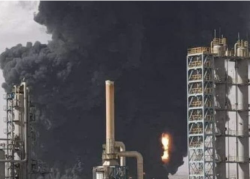US election 2020: What the US election will mean for the UK
- 2020-10-26 15:23:00


 Pierre Rayer: Art, Science, and Happiness: The Universal Mission of Transmission to Future Generations through Patronage at the Louvre Abu Dhabi
Pierre Rayer: Art, Science, and Happiness: The Universal Mission of Transmission to Future Generations through Patronage at the Louvre Abu Dhabi Ahly crowned Super champions after dramatic extra-time win over Modern Future FC
Ahly crowned Super champions after dramatic extra-time win over Modern Future FC Yemeni Honey..A Development Wealth Threatened By Conflict And Climate Change
Yemeni Honey..A Development Wealth Threatened By Conflict And Climate Change California wildfires: Millions warned of possible power cut
California wildfires: Millions warned of possible power cut Central African rebels launch attacks near capital
Central African rebels launch attacks near capital Netanyahu: Israel to remain in buffer zone in southern Syria
Netanyahu: Israel to remain in buffer zone in southern Syria EU Naval Mission Secures Arrival of Wheat Shipment to Aden Port
EU Naval Mission Secures Arrival of Wheat Shipment to Aden Port China’s CNPC seeks to exit Sudan oil venture, citing war damage
China’s CNPC seeks to exit Sudan oil venture, citing war damage GCC condemns Iranian statements undermining Gulf states’ sovereignty
GCC condemns Iranian statements undermining Gulf states’ sovereignty Tunisia defeat hosts Qatar 3-0, both nations exit FIFA Arab Cup
Tunisia defeat hosts Qatar 3-0, both nations exit FIFA Arab Cup
